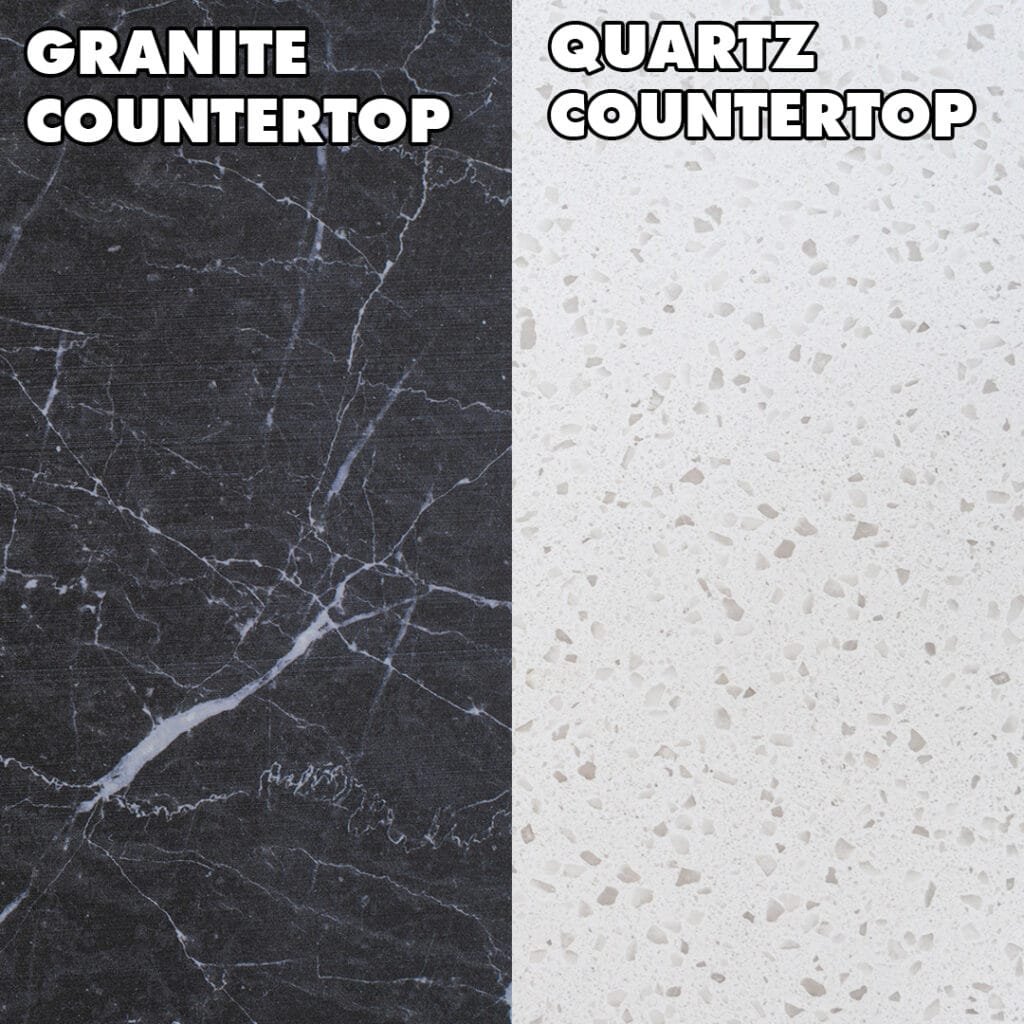
When remodeling your kitchen, one of the most significant decisions you'll face is selecting the right countertop material.
When remodeling your kitchen, one of the most significant decisions you’ll face is selecting the right countertop material. Among numerous kitchen countertop ideas, granite countertop and quartz countertop stand out as two of the most popular options due to their beauty, durability, and overall performance. In this detailed guide, we’ll explore the pros and cons of granite and quartz countertops, providing you with valuable insights to help you make an informed decision.

Granite Countertop: Natural Elegance for Your Kitchen
Granite is a natural stone quarried directly from the earth, making each piece unique in pattern and color. Granite countertops bring unparalleled elegance and luxurious aesthetics to any kitchen, often making them the focal point of countertop design.
Advantages of Granite Countertop
1. Natural Beauty and Uniqueness
The primary appeal of a granite countertop is its unique and natural beauty. Since granite is a naturally occurring stone, each slab varies, giving homeowners endless possibilities when incorporating granite into kitchen countertop ideas. From subtle speckles to dramatic veins, there’s a granite design to complement any style.
2. Heat and Scratch Resistance
Granite countertops excel in heat resistance, allowing homeowners to place hot pans directly onto the surface without fear of damage. Additionally, granite is incredibly durable and scratch-resistant, which makes it ideal for kitchens with high daily activity.
3. Increased Home Value
Installing a granite countertop in your kitchen significantly boosts your home’s resale value. Granite countertops are highly sought-after and convey luxury, durability, and quality craftsmanship to potential buyers.
4. Longevity and Durability
With proper sealing and care, granite countertops can last a lifetime. Granite is incredibly resilient, making it a great investment over time.
Disadvantages of Granite Countertop
1. Maintenance Requirements
Granite countertops are porous and need regular sealing to prevent staining and bacteria buildup. This sealing process should be done once or twice a year, depending on usage and the granite’s quality.
2. Higher Cost
While granite countertops offer many benefits, their installation can be slightly more expensive than other countertop materials. However, their durability and lifespan justify this initial cost.
Expert Tip: For detailed information on how to choose granite countertop, consider factors like color, thickness, patterns, and edging styles.
Quartz Countertop: Engineered for Versatility
Unlike granite, quartz countertop is engineered from natural quartz crystals combined with resins and pigments. This manufacturing process produces countertops that are highly customizable and consistent in appearance.
Advantages of Quartz Countertop
1. Non-Porous and Hygienic
Quartz countertops are engineered to be non-porous, making them resistant to staining and bacteria buildup. They are an excellent option for families and busy kitchens where hygiene is a priority.
2. Low Maintenance
Unlike granite countertops, quartz does not require sealing. Its engineered nature simplifies care and makes quartz countertops ideal for homeowners who prefer minimal maintenance.
3. Wide Range of Colors and Styles
Quartz countertops offer unparalleled versatility. Since they are engineered, quartz countertops can replicate the look of natural stones, including marble countertop and granite countertop styles, as well as contemporary designs not found in nature.
4. Durability and Consistency
Quartz countertops provide remarkable durability, similar to granite, but with more consistency in color and patterns. This consistency is advantageous for homeowners seeking uniformity in their countertop design.
Disadvantages of Quartz Countertop
1. Susceptible to Heat Damage
Quartz countertops can be damaged by excessive heat. Unlike granite, quartz can discolor or crack if hot pans or pots are placed directly onto its surface without protection.
2. Artificial Appearance
Though quartz countertops can imitate natural stone closely, some homeowners find the engineered look less appealing than the natural uniqueness found in granite countertop slabs.
Granite vs Quartz Countertop Installation and Cost
Installation Differences
Both granite and quartz countertops require professional countertop installation due to their weight and complexity. However, granite countertop installation typically takes slightly longer because each slab requires careful measurement, cutting, and finishing to preserve its unique patterns and colors.
Quartz countertop installation is quicker because it comes prefabricated and ready for fitting. However, precise and careful handling is essential to ensure durability and correct placement.
Cost Comparison
Granite countertop costs generally fluctuate depending on the rarity and uniqueness of the stone. Prices can range significantly based on color, quality, and origin. Quartz countertops, however, have a more predictable pricing structure, determined mainly by brand and color rather than uniqueness.
Preparing an Installation of Countertop: Important Tips
Whether you’re opting for granite or quartz countertops, proper preparation before countertop installation is critical. To avoid costly mistakes and ensure a smooth installation, homeowners should follow these expert recommendations:
- Take accurate measurements of your kitchen worktop area.
- Ensure cabinets and supports can handle the countertop’s weight.
- Coordinate with installers to ensure the timing aligns with kitchen renovations.
For detailed guidelines on preparing an installation of countertop, professional advice can greatly simplify the process.
Final Thoughts: Granite Countertop or Quartz Countertop?
Both granite and quartz countertops offer distinctive advantages suited to different homeowner preferences and kitchen styles. The decision between the two largely comes down to personal aesthetics, budget, lifestyle, and maintenance preferences.
- Choose granite countertop if you prefer natural beauty, heat resistance, unique patterns, and a luxurious feel.
- Choose quartz countertop if low maintenance, durability, consistent appearance, and hygiene are your top priorities.
Ultimately, both materials significantly enhance kitchen designs, improve home values, and provide durable solutions for daily use.
By carefully considering your priorities and understanding the strengths and weaknesses of each countertop material, you can confidently select the perfect kitchen countertop for your home.
Whether you choose a beautiful natural granite countertop or opt for engineered quartz, both materials promise to deliver elegance, functionality, and long-lasting beauty to your kitchen worktop.

